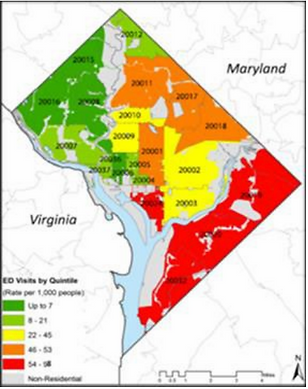Coalition for Environmentally Safe Communities

DC Asthma Coalition


Mission
The mission of the DC Asthma Coalition is to unite organizations and agencies across the District of Columbia to reduce the burden of asthma on residents, especially those disproportionately affected by racial and income disparities. By enhancing access to timely, quality care, promoting environmental health programs, and advocating for data-driven policies, we strive to eliminate disparities in asthma-related emergency room visits and hospitalizations. Our goal is to create healthier home, school, and community environments for all individuals with asthma in D.C., regardless of their socioeconomic status or language.
Vision
This is a Paragraph. Click on "Edit Text" or double click on the text box to start editing the content and make sure to add any relevant details or information that you want to share with your visitors.

About Us
Asthma Statistics
In the United States, about 8% of adults and 7% of children have asthma (CDC). Asthma is a significant cause of missed school and work days. Washington D.C. has a significant asthma problem, particularly among children and adults. Various sources report different but consistently high rates of asthma prevalence in D.C. compared to national averages. For childhood asthma in D.C., estimates range from 8.1% to 9.7%, placing it among the highest in the nation, while adult asthma rates are reported between 11.6% and 18.1%, with some sources ranking D.C. as having the highest adult asthma rate in the country. These figures consistently show D.C.'s asthma rates exceeding the national averages across different age groups and data sources.

Pediatric Emergency Room Visit Rates by Zip Code
Source: Children’s National IMPACT DC Asthma Clinic

Strategic Plan
The DC Asthma Coalition, a multistakeholder group collaborating with District agencies, developed a strategic plan to reduce the asthma burden for residents. The plan focuses on enhancing asthma data availability, promoting data collection and analysis, improving access to quality care, reducing environmental triggers, and developing policies to eliminate disparities in asthma-related emergency room visits and hospitalizations, with a special emphasis on low-income and racial minority populations.
Letter to Medicaid
The undersigned organizations and individuals urge the DC Department of Health Care Finance to include asthma environmental assessment, home visiting, and remediation services in its 1115 waiver request for Medicaid funding. Evidence supports the efficacy of these programs in reducing asthma-related emergency room visits and hospitalizations, particularly for low-income families in the District. Several states have successfully implemented similar programs, demonstrating cost-neutrality or savings for their Medicaid or CHIP programs.
